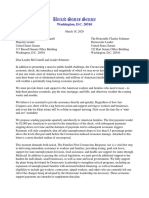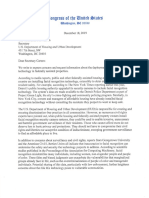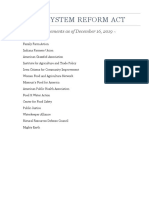Professional Documents
Culture Documents
Letter To Secretary Bernhardt On Wolf Delisting
Uploaded by
Senator Cory Booker0 ratings0% found this document useful (0 votes)
2K views3 pagesSenators Booker and Whitehouse led a letter to Secretary of the Interior David Bernhardt expressing opposition to the U.S. Fish and Wildlife Service’s proposal to end federal protections for gray wolves under the ESA.
Original Title
Letter to Secretary Bernhardt on Wolf Delisting
Copyright
© © All Rights Reserved
Available Formats
PDF or read online from Scribd
Share this document
Did you find this document useful?
Is this content inappropriate?
Report this DocumentSenators Booker and Whitehouse led a letter to Secretary of the Interior David Bernhardt expressing opposition to the U.S. Fish and Wildlife Service’s proposal to end federal protections for gray wolves under the ESA.
Copyright:
© All Rights Reserved
Available Formats
Download as PDF or read online from Scribd
0 ratings0% found this document useful (0 votes)
2K views3 pagesLetter To Secretary Bernhardt On Wolf Delisting
Uploaded by
Senator Cory BookerSenators Booker and Whitehouse led a letter to Secretary of the Interior David Bernhardt expressing opposition to the U.S. Fish and Wildlife Service’s proposal to end federal protections for gray wolves under the ESA.
Copyright:
© All Rights Reserved
Available Formats
Download as PDF or read online from Scribd
You are on page 1of 3
Wnited States Senate
WASHINGTON, DC 20510
July 8, 2019
The Honorable David Bernhardt
Secretary
USS. Department of the Interior
1849 C Street, NW
Washington, DC 20240
Dear Secretary Bemhardt:
We are writing to express our concems with the U.S. Fish and Wildlife Service's proposal to end
federal protections for gray wolves under the Endangered Species Act (ESA). Ata time when
scientists indicate that up to 1 million plant and animal species face extinction due to human.
activity, we are alarmed that the Trump Administration is seeking to remove vital protections for
this vulnerable species. The delisting proposal appears to be motivated primarily by political
pressure rather than rooted in the best available science, and would set a dangerous precedent for
hundreds of other endangered species nationwide. As such, we urge you to withdraw the
proposed rule.
‘Thanks to the ESA, wolves have now started to recover in the continental United States after
being brought to the brink of extinction, However, wolf populations are still struggling to
rebound in many areas of suitable habitat, and are missing entirely from the vast majority of their
former range. Scientists estimate there were once hundreds of thousands of wolves in the lower
48 states, but today there are only a tiny fraction of that number. In particular, wolves have only
just begun to return to portions of the Pacific Northwest and California, and the need for federal
protection remains eritical if this species is to truly recover.
Within their habitat, wolves play an essential role in maintaining a balanced and resilient
ecosystem. The progress made toward wolf recovery in the western Great Lakes and northem
Rocky Mountains has been a boon for the ecosystems of these areas, which have benefitted from
the return of this keystone predator. Studies in Yellowstone National Park found that the
presence of wolves benefit a myriad of species including pronghorn antelope, songbirds, beavers,
and fish.
While there is much to be proud of, there remains considerable progress to be made towards wolf
recovery in the lower 48 states. We are concerned that returning the wolves wholly to state
management at this time could stall or even reverse that progress as federal protections ate still
essential to help wolves return to suitable habitat in their historic range.
Humans pose a far greater threat to wolves than wolves pose to us. Moreover, U.S. Department
of Agriculture reports show that the primary causes of cattle and sheep deaths in the U.S. are
health problems, weather, theft, and illness—not wolves or other native carnivores. In fact, a
2014 and 2015 inventory of cattle and sheep found that less than one percent (0.4 percent) died
from any type of carnivore, including coyotes, domestic dogs, and cougars. There are also a host
of highly effective non-lethal solutions that livestock owners can use to protect their herds.
Gray wolf recovery in the lower 48 states is a wildlife success story in the making, and we
encourage the U.S. Fish and Wildlife Service to continue to work towards recovery of this iconic
American species. Specifically, we urge the Service to continue to protect gray wolves under the
ESA.
Sincerely,
.
Cory A. Booker Idon Whitehouse
United States Senator United States Senator
Z Peters - Richard Blumenthal Ap
United States Senator United States Senator
Silber. Keto, Ab throm
Tom Udall Kirsten Gillibrand
United States Senator United States Senator
‘
LA forte
Bernard Sanders Kai ‘D. Harris
United States Senator United States Senator
Kista Sgn
Dianne Feinstein Patrick Leahy
United States Senator United States Senator
Edward * d
United States Senator
United States Senator
Robert Menendez
United States Senator
ited S
snator
Unifed States Senator
United States Senator
Mp
Catherine Col io
United States Senator
You might also like
- 3.27.20 Booker Letter To Dhs Ice and CBP Final SignedDocument5 pages3.27.20 Booker Letter To Dhs Ice and CBP Final SignedSenator Cory BookerNo ratings yet
- 20.3.31.FINAL AdvaMedDocument2 pages20.3.31.FINAL AdvaMedSenator Cory BookerNo ratings yet
- 20.4.3. FINAL FEMA Ventilator RequestDocument2 pages20.4.3. FINAL FEMA Ventilator RequestSenator Cory BookerNo ratings yet
- Letter Re Cash Payments - 3.18.20Document3 pagesLetter Re Cash Payments - 3.18.20Senator Cory Booker100% (1)
- Letter To Amazon Re: CoronavirusDocument2 pagesLetter To Amazon Re: CoronavirusSenator Cory Booker100% (4)
- 20.3.21. FINAL - PPE + Supplies Letter To Trump + AzarDocument2 pages20.3.21. FINAL - PPE + Supplies Letter To Trump + AzarSenator Cory Booker100% (1)
- USPS Letter Re: COVID-19Document3 pagesUSPS Letter Re: COVID-19Senator Cory Booker80% (5)
- MSI Funding LetterDocument3 pagesMSI Funding LetterSenator Cory BookerNo ratings yet
- Booker, Menendez Letter To HHS Re: Coronavirus Supplemental FundingDocument1 pageBooker, Menendez Letter To HHS Re: Coronavirus Supplemental FundingSenator Cory BookerNo ratings yet
- Care For COVID-19 ActDocument6 pagesCare For COVID-19 ActSenator Cory BookerNo ratings yet
- Mobile Hotspot Letter To PresidentDocument2 pagesMobile Hotspot Letter To PresidentSenator Cory BookerNo ratings yet
- CB RM Airport Screenings Letter To Pence 3.10.20Document3 pagesCB RM Airport Screenings Letter To Pence 3.10.20Senator Cory Booker100% (1)
- Booker Unemployment Insurance BillDocument9 pagesBooker Unemployment Insurance BillSenator Cory BookerNo ratings yet
- 3.18.20 - Senator Booker Letter To BOP DirectorDocument2 pages3.18.20 - Senator Booker Letter To BOP DirectorSenator Cory BookerNo ratings yet
- 19.12.06 - University HospitalDocument1 page19.12.06 - University HospitalSenator Cory BookerNo ratings yet
- 20.3.3. Letter To Leadership On Coronavirus FundingDocument2 pages20.3.3. Letter To Leadership On Coronavirus FundingSenator Cory BookerNo ratings yet
- Booker Wyden-Led Letter To HUD RE Facial Recognition TechnologiesDocument3 pagesBooker Wyden-Led Letter To HUD RE Facial Recognition TechnologiesSenator Cory BookerNo ratings yet
- Farm System Reform Act Endorsements 12 16 PDFDocument1 pageFarm System Reform Act Endorsements 12 16 PDFSenator Cory BookerNo ratings yet
- 19.04.12-US Army Corps Cheesequake CreekDocument2 pages19.04.12-US Army Corps Cheesequake CreekSenator Cory BookerNo ratings yet
- Support Letter - Decentralized Wastewater Grant Act - 2.11.20Document1 pageSupport Letter - Decentralized Wastewater Grant Act - 2.11.20Senator Cory BookerNo ratings yet
- Farm System Reform ActDocument35 pagesFarm System Reform ActSenator Cory Booker100% (1)
- SFRC Letter 1.25.20 On Mary Louise KellyDocument2 pagesSFRC Letter 1.25.20 On Mary Louise KellySenator Cory Booker100% (1)
- Maternal Health Day Awareness ResolutionDocument5 pagesMaternal Health Day Awareness ResolutionSenator Cory Booker100% (1)
- S.Res.516: 2020 Black History Month ResolutionDocument5 pagesS.Res.516: 2020 Black History Month ResolutionSenator Cory BookerNo ratings yet
- Senate Resolution Supporting Farmers Bill of RightsDocument8 pagesSenate Resolution Supporting Farmers Bill of RightsSenator Cory BookerNo ratings yet
- 12.18 Immigration Hotline Letter To DHS ICEDocument4 pages12.18 Immigration Hotline Letter To DHS ICESenator Cory BookerNo ratings yet
- Farm System Reform Act EndorsementsDocument1 pageFarm System Reform Act EndorsementsSenator Cory BookerNo ratings yet
- Section by Section Summary Farm System Reform ActDocument3 pagesSection by Section Summary Farm System Reform ActSenator Cory BookerNo ratings yet
- 1.1.0.20 LTR To POTUS Re Protection of Embassy SecurityDocument2 pages1.1.0.20 LTR To POTUS Re Protection of Embassy SecuritySenator Cory BookerNo ratings yet
- 12.17.19 Letter On Tongass Roadless Native RightsDocument3 pages12.17.19 Letter On Tongass Roadless Native RightsSenator Cory BookerNo ratings yet
- The Subtle Art of Not Giving a F*ck: A Counterintuitive Approach to Living a Good LifeFrom EverandThe Subtle Art of Not Giving a F*ck: A Counterintuitive Approach to Living a Good LifeRating: 4 out of 5 stars4/5 (5784)
- The Little Book of Hygge: Danish Secrets to Happy LivingFrom EverandThe Little Book of Hygge: Danish Secrets to Happy LivingRating: 3.5 out of 5 stars3.5/5 (399)
- Hidden Figures: The American Dream and the Untold Story of the Black Women Mathematicians Who Helped Win the Space RaceFrom EverandHidden Figures: The American Dream and the Untold Story of the Black Women Mathematicians Who Helped Win the Space RaceRating: 4 out of 5 stars4/5 (890)
- Shoe Dog: A Memoir by the Creator of NikeFrom EverandShoe Dog: A Memoir by the Creator of NikeRating: 4.5 out of 5 stars4.5/5 (537)
- Grit: The Power of Passion and PerseveranceFrom EverandGrit: The Power of Passion and PerseveranceRating: 4 out of 5 stars4/5 (587)
- Elon Musk: Tesla, SpaceX, and the Quest for a Fantastic FutureFrom EverandElon Musk: Tesla, SpaceX, and the Quest for a Fantastic FutureRating: 4.5 out of 5 stars4.5/5 (474)
- The Yellow House: A Memoir (2019 National Book Award Winner)From EverandThe Yellow House: A Memoir (2019 National Book Award Winner)Rating: 4 out of 5 stars4/5 (98)
- Team of Rivals: The Political Genius of Abraham LincolnFrom EverandTeam of Rivals: The Political Genius of Abraham LincolnRating: 4.5 out of 5 stars4.5/5 (234)
- Never Split the Difference: Negotiating As If Your Life Depended On ItFrom EverandNever Split the Difference: Negotiating As If Your Life Depended On ItRating: 4.5 out of 5 stars4.5/5 (838)
- The Emperor of All Maladies: A Biography of CancerFrom EverandThe Emperor of All Maladies: A Biography of CancerRating: 4.5 out of 5 stars4.5/5 (271)
- A Heartbreaking Work Of Staggering Genius: A Memoir Based on a True StoryFrom EverandA Heartbreaking Work Of Staggering Genius: A Memoir Based on a True StoryRating: 3.5 out of 5 stars3.5/5 (231)
- Devil in the Grove: Thurgood Marshall, the Groveland Boys, and the Dawn of a New AmericaFrom EverandDevil in the Grove: Thurgood Marshall, the Groveland Boys, and the Dawn of a New AmericaRating: 4.5 out of 5 stars4.5/5 (265)
- The Hard Thing About Hard Things: Building a Business When There Are No Easy AnswersFrom EverandThe Hard Thing About Hard Things: Building a Business When There Are No Easy AnswersRating: 4.5 out of 5 stars4.5/5 (344)
- On Fire: The (Burning) Case for a Green New DealFrom EverandOn Fire: The (Burning) Case for a Green New DealRating: 4 out of 5 stars4/5 (72)
- The World Is Flat 3.0: A Brief History of the Twenty-first CenturyFrom EverandThe World Is Flat 3.0: A Brief History of the Twenty-first CenturyRating: 3.5 out of 5 stars3.5/5 (2219)
- The Unwinding: An Inner History of the New AmericaFrom EverandThe Unwinding: An Inner History of the New AmericaRating: 4 out of 5 stars4/5 (45)
- The Gifts of Imperfection: Let Go of Who You Think You're Supposed to Be and Embrace Who You AreFrom EverandThe Gifts of Imperfection: Let Go of Who You Think You're Supposed to Be and Embrace Who You AreRating: 4 out of 5 stars4/5 (1090)
- The Sympathizer: A Novel (Pulitzer Prize for Fiction)From EverandThe Sympathizer: A Novel (Pulitzer Prize for Fiction)Rating: 4.5 out of 5 stars4.5/5 (119)
- Her Body and Other Parties: StoriesFrom EverandHer Body and Other Parties: StoriesRating: 4 out of 5 stars4/5 (821)






































































